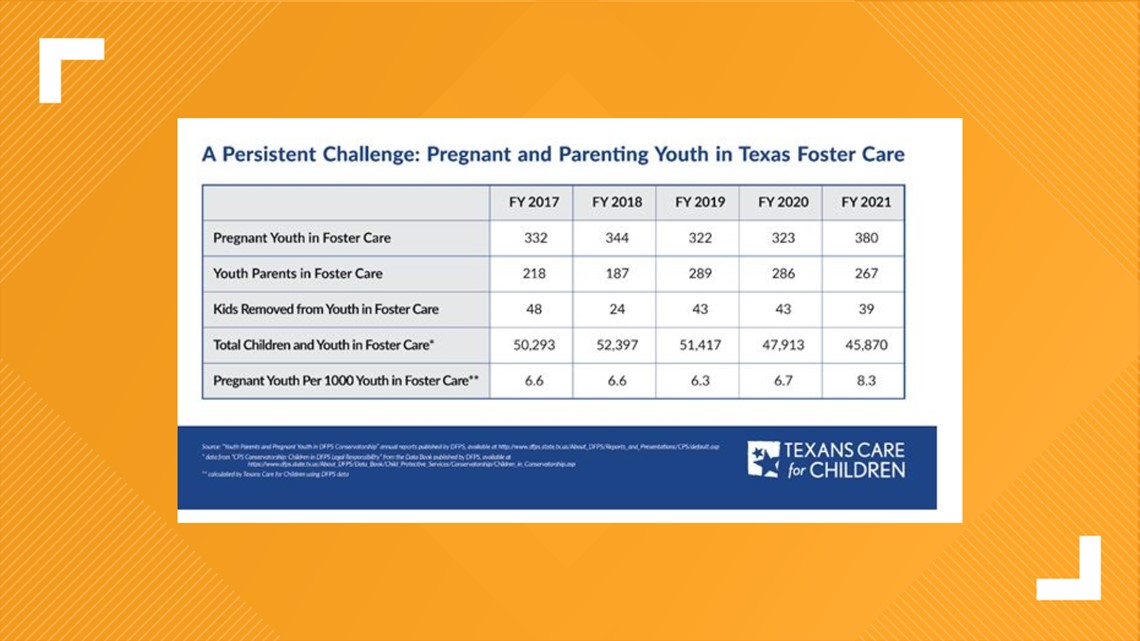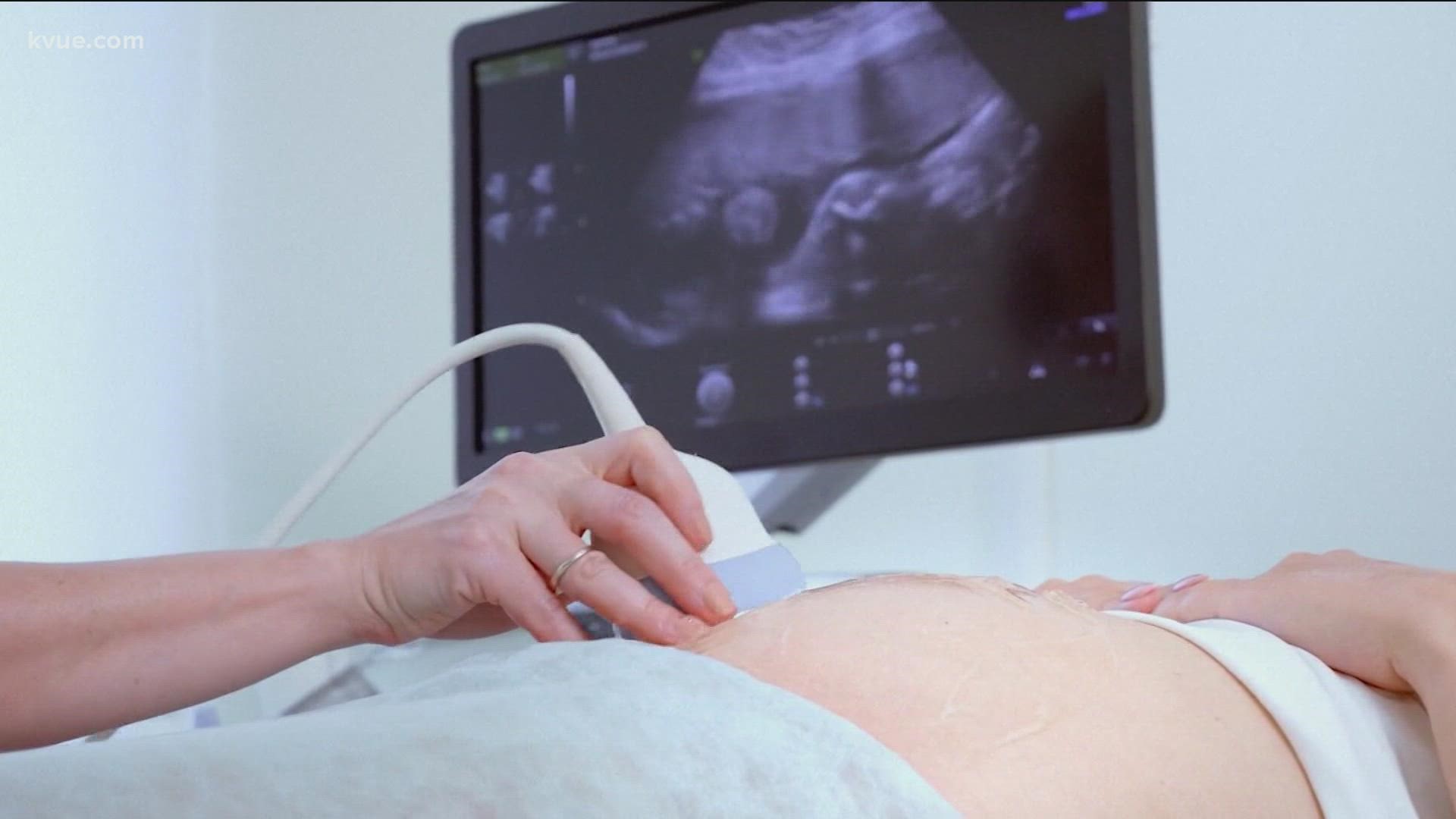AUSTIN, Texas — Local advocates say a recent report by the Texas Department of Family and Protective Services (DFPS) shows that the state has a consistent challenge with teen pregnancy in the foster care system.
The report shows that in 2021, more youth in Texas foster care were pregnant than in any of the past four years.
Some key findings of the annual statewide report were:
- 380 youth in foster care were pregnant
- 267 youth in foster care were parents to their own children
- 39 children were removed by Child Protective Services from youth who were still in foster care themselves
The nonpartisan policy organization Texans Care for Children found that this report shows 8.3 youth in foster care were pregnant in 2021 out of every 1,000. This comes out to one in every 120 youth in foster care being pregnant in 2021 – higher than in past years. Between 2017 and 2020, reports show around six out of every 1,000 foster youth were pregnant.
Texans Care for Children said the Legislature has put a lot of effort into improving the foster care system in recent years, but more still needs to be done. The organization's two main goals when it comes to pregnancy in foster care are to prevent pregnancies from happening and to support the youth who do become pregnant and become parents.


When it comes to pregnancy prevention, one challenge is that kids generally move around multiple times when in the foster care system, so they may miss out on important sex education.
“So, they might not be at school on the one day that it's covered or the one time there's a program on it, or they may be out of school for some reason, or they may miss that day because they have a court hearing,” said Kate Murphy, the senior policy associate for child protection at Texans Care for Children. "So, we really need to focus within the system on how to make sure we're getting this information to kids. And I think one of the best ways to do that is equipping the adults to have the conversation. So, that's been a key focus.”
Murphy said the State does have some guidelines for getting teens in foster care educated on this topic, but not all caregivers feel comfortable having those conversations. That's why Murphy said meaningful adult relationships are a key way to educate and support the youth in foster care.
“A lot of what we focus on is really trying to build better supports around older youth, generally, so we can have more supportive adults in each teen's life,” Murphy said. “And, specifically, we're hoping to create really trusting relationships where teens have someone they can talk to about healthy relationships and sexual health. That's been a pretty significant gap in our system.”
Murphy said, looking at the numbers, the fact that 39 kids were removed from pregnant youth in foster care sticks out to her. She said it shows Texas needs more support for these young moms.
"We should be able to help 39 children stay with their parents and keep them safe with their parents, instead of putting their parents through the additional trauma of losing their child after already being split apart from their families,” Murphy said. “Being in the foster care system, they've gone through so much and that can be a really painful experience."
One place that these young moms can get support both when they are pregnant and once they give birth is at the SAFE Alliance Shelter. SAFE has an Early Childhood and Teen Parent Program, which is a residential program for pregnant and parenting teens in the foster care system and their children. The parents and their babies get to live at the shelter.
The goal of the shelter is to support the young women and teach them how to parent since many of these moms need good role models to look to.
“So, especially if a young mom has herself experienced a lot of trauma and tons of abuse, then those are going to become patterns that feel familiar and normal the way in which she has. And I use ‘she’ because most of the kids are moms, and the ways that they've been parented might be the ways that they would parent their own kids,” said Julia Spann, co-CEO for the SAFE Alliance.
She said these moms work hard to be great parents and are very grateful to have supportive adults at the shelter.
"We're just constantly amazed at the resilience of people,” Spann said. “They love their babies. They want to be good parents. Those seem to be very universal things. They're open to learning and they really, really appreciate being surrounded by the intense support that we provide."
Spann said it is generally just young women who stay at the shelter with their babies, but they will occasionally have a father of a child there too. They also sometimes have young women who have multiple children. The pregnant youth and youth moms are usually 14 to 19 years old.
SAFE usually has seven to eight moms and seven to eight babies at the shelter at a time but, due to recent staffing shortages, the shelter is housing a lower number right now. Spann said this shows the importance of having more resources like the SAFE Shelter.
If you want to help, SAFE does take formula and diaper donations. SAFE also wants people to know they have a 24/7 hotline to help young mothers who may need guidance or others in need of help. That number is 512-267-7233. You can also text 737-888-7233.
PEOPLE ARE ALSO READING:

